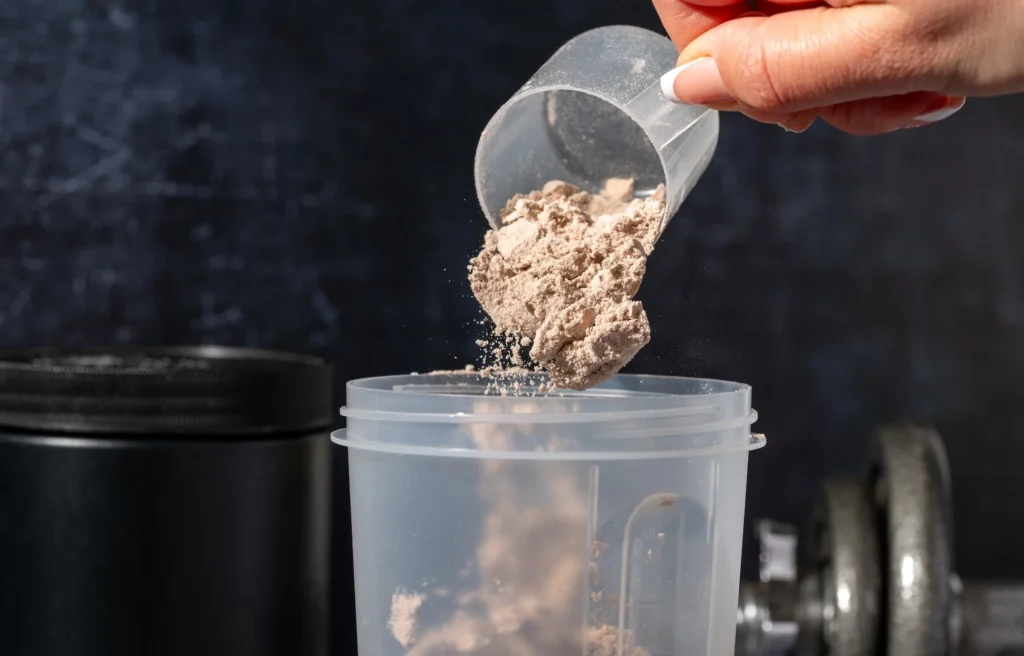After an explosive report cast several supplement brands in a negative light, brands responded to defend their products, while experts told ATN what readers should really take away from the findings
The protein boom is as strong as ever, but recent news created some doubt as protein powder came under fire in the wake of an explosive Consumer Reports expose.
The report, which included results from testing 23 different protein powders and shakes, offered a look into heavy metal contamination across these popular supplements. For all of its tests, the nonprofit organization uses standards set by the California Proposition 65 law to protect consumers from chemicals known to cause cancer, birth defects or other reproductive harm.
The stir that Consumer Reports’ article caused has brought the protein obsession back into the spotlight, begging the question of what place the supplements have in people’s daily nutrition, how safe they are and what this all means for protein companies.
Athletech News spoke with scientific experts and protein brands themselves to help answer these questions and more.
What They Found
Over two-thirds of the products analyzed in the report contained more lead in a single serving than Consumer Reports’ food safety experts claim is safe to consume in a day (the Prop 65 limit of 0.5 micrograms per day), with some exceeding it by over 10 times. Plant-based protein powders were the biggest culprits.
Additionally, three products exceeded the level of concern for two other toxic heavy metals, cadmium and inorganic arsenic.
The report advised against daily use of protein powders in general due to potential heavy metal exposure and stated that the supplements aren’t necessary to hit protein goals anyway.
The two topping the list — which Consumer Reports suggested avoiding entirely — were Naked Nutrition’s Mass Gainer powder at 7.7 micrograms of lead per serving, claimed to be roughly 1,570% of the level of concern for the heavy metal, and Huel’s Black Edition powder, with 6.3 micrograms of lead, or about 1,290% of the Prop 65 daily lead limit.
Two other powders contained between 400 and 600% of Consumer Reports’ level of concern: Garden of Life’s Sport Organic Plant-Based Protein and Momentous’ 100% Plant Protein. Those should be limited to once per week, the report advised.
Other powders tested included: MuscleMeds, Optimum Nutrition, Jocko Fuel, Vega, Quest, Equip, Plant Fusion, Ensure, Muscle Milk, KOS, Owyn, Transparent Labs, BSN, Dymatize and Muscle Tech.
Experts Contextualize the Report
Lead exposure is associated with a whole host of adverse health effects, impacting brain and reproductive health in adults, and causing severe developmental issues for children who are more vulnerable to higher absorption rates.
“There is no safe level of lead; we want to minimize exposure as much as possible,” senior scientist for the Environmental Working Group (EWG), Tasha Stoiber, told Athletech News.
But how do heavy metals like lead get into protein powders to begin with?
“Heavy metals like lead are naturally present in our environment like in our soil and water,” food scientist Abbey Thiel told ATN. “Plants absorb small amounts of these elements as they grow, so any ingredient that comes from plants can contain trace levels.”
Sourcing is key, Thiel explained, as where the plant is grown can vary its lead exposure quite a bit due to historical industrial agriculture and pesticide practice or higher rates of naturally occurring metals.
As for the safety of these products, Thiel acknowledged that it isn’t as simple as looking at the numbers.
“The levels found in many protein powders are usually quite small, often measured in micrograms. That’s a millionth of a gram,” she explained. “So one serving isn’t going to cause acute lead poisoning.”
While Thiel cautioned that using the conservative Prop 65 benchmark makes the report more shocking, that doesn’t mean the awareness it raised wasn’t valid.
“The concern is really about chronic exposure,” Thiel added. “If you’re drinking a shake every day for months or years, those small amounts can add up.”
Stoiber also pointed out that frequent protein supplementation in and of itself isn’t necessary, and could come with health concerns outside of lead exposure.
“Most people get enough protein from their diet; you don’t need to take in extra protein,” she said, excluding cases like older adults who struggle to meet protein needs with declining appetites, and professional athletes.
“You are missing out on the additional nutrients if you’re not eating foods to get your protein,” Stoiber added. Moreover, a protein-dominant diet can often come with the detrimental tradeoff of not eating enough fiber as your body fills up on protein, she added.
How Brands Have Responded
One of the brands included in the report was fast-growing supplement maker Momentous, whose chocolate plant protein tested on the higher end and was recommended to limit once per week.
The company quickly responded, claiming that the specific product tested was an older version of its current plant protein, which is of higher quality.
Momentous chose to reach out to consumers immediately after the Consumer Reports findings were published, stating that each batch of its protein goes through three layers of testing and verification through Light Labs testing, whose results are available publicly.
Momentous CEO, Jeff Byers, said consumer response to the company’s message was “overwhelmingly positive.”
“Our protein sales for both plant and whey increased pretty significantly,” Byers told ATN.

Many who had unsubscribed to Momentous quickly resubscribed following the response, Byers revealed, while others just opted to switch from plant to whey protein, which has lower concentrations of heavy metals due to less direct soil exposure.
In the company’s response, Byers emphasized the importance of putting the numbers in context. That’s why Momentous added data placing its product up against other foods that also contain trace amounts of lead from being grown in soil, including:
Tomato (one medium, ~150g): ~3.2 mcg.
Apple (one medium, ~180g): ~1.0 mcg.
Strawberries (8–10 pieces, ~100g): ~1.0–1.5 mcg.
Momentous Plant Protein (one serving): 0.29–0.7 mcg.
“There’s so much noise, but also creating noise and fear without context,” Byers remarked.
“I think what’s really important is that we … create the transparency to allow people to understand what is in the products they take,” he added. “It’s not a tomato that is going to kill you, or a scoop of whey protein or plant protein. It’s the cumulative effect of the lifestyle choices that you’re making as a whole that matter.”
While Thiel agrees that putting it in context matters, the comparisons between protein powder and fruits and vegetables can be misleading, she argues.
“When you eat fruits, vegetables, or grains, you’re consuming them in their natural form, with a lot of water and fiber diluting everything else,” she explained. “Protein powders are made by taking a plant like peas or rice and processing it down to isolate the protein. That concentration process removes water and many other components, which means any heavy metals that were present become more concentrated in the final powder.”
“How the ingredient is processed makes a big difference in the final levels,” Thiel added. “It’s similar to how dried fruit has more sugar per gram than fresh fruit because the water is removed.”
Huel, another brand included in the report whose Black Edition Chocolate powder topped the report with some of the highest lead concentrations, addressed the findings with a blog post explaining that the quantities are compliant with FDA and EU standards.
Ritual, a supplement brand not included in the report, prides itself on its testing transparency and sourcing quality as well.
Dr. Nima Alamdari, Ritual’s chief scientific and clinical officer, said that being Clean Label Project Certified and having a Certificate of Traceability — both of which Ritual has — can provide consumers some security when scrutinizing which protein supplements to buy.
“Consumers should be concerned about contamination in supplements,” Alamdari told ATN. While he said that some contamination is unavoidable, there are better options than others.
“We’re in a period where words don’t matter anymore,” he added. “It comes down to data.”
How Cautious Should Consumers Be?
Alamdari advises looking for products with that Clean Label Project certification, which follows the Prop. 65 guidelines. But that doesn’t mean you need to throw out your protein powder.
“You just don’t want to have one of the higher brands every day or twice a day,” EWG scientist Stoiber said.
It’s also impossible to entirely avoid heavy metals, unfortunately, Thiel said, because they are prominently a part of our environment.
“The goal is to minimize exposure from multiple sources,” she explained. “The biggest concern comes from products that are both concentrated and consumed daily because that can lead to a higher total intake over time.”
For anyone hoping to keep up their protein powder consumption, Thiel and Stoiber advise keeping it a minimal part of your diet, which should include a spectrum of foods, especially plants.
“I always say eat a diverse and highly varied diet,” Thiel said. “Not only will you consume a high variation of vitamins, minerals, and other nutrients, you will also avoid eating high levels of a contaminant like lead.”



